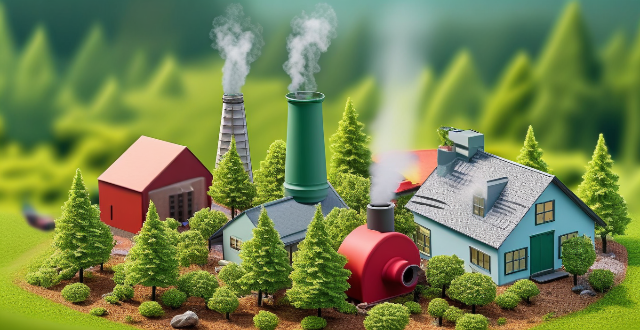Climate goals, aiming to reduce greenhouse gas emissions and promote renewable energy sources, significantly impact the economy and job market. The growth of the renewable energy sector creates new business opportunities and jobs, while carbon pricing mechanisms incentivize companies to invest in cleaner technologies. Green infrastructure investments stimulate economic growth by creating jobs and improving public health. However, achieving climate goals can also displace workers in fossil fuel-dependent industries, necessitating support and training programs for transitioning into new roles within the green economy. Education and training focused on sustainability and renewable energy are crucial to meet the demands of the changing job market. Overall, prioritizing climate goals presents challenges but also offers numerous opportunities for economic growth and job creation in industries related to sustainability practices.

How Climate Goals Affect the Economy and Job Market
Introduction
Climate goals are becoming increasingly important as governments and organizations around the world recognize the urgent need to address climate change. These goals aim to reduce greenhouse gas emissions, promote renewable energy sources, and protect natural resources. However, achieving these objectives can have significant implications for the economy and job market. In this article, we will explore how climate goals affect the economy and job market.
Impact on the Economy
Renewable Energy Sector
One of the most significant impacts of climate goals is the growth of the renewable energy sector. As countries strive to reduce their reliance on fossil fuels, there is a growing demand for renewable energy sources such as solar, wind, and hydro power. This shift towards renewable energy creates new opportunities for businesses and investors, leading to economic growth and job creation in related industries.
Carbon Pricing Mechanisms
Another way that climate goals can impact the economy is through carbon pricing mechanisms. These policies put a price on carbon emissions, either through taxes or cap-and-trade systems, which encourage companies to reduce their carbon footprint. While this may lead to higher costs for some industries, it also creates incentives for businesses to invest in cleaner technologies and practices, ultimately benefiting the economy as a whole.
Green Infrastructure Investments
Investments in green infrastructure, such as public transportation systems, energy-efficient buildings, and waste management facilities, can also stimulate economic growth. These investments not only create jobs but also improve the quality of life for citizens by reducing air pollution and improving public health.
Impact on the Job Market
New Job Opportunities
Achieving climate goals requires a workforce with specialized skills and knowledge in areas such as renewable energy, energy efficiency, and environmental protection. This creates new job opportunities in industries that are traditionally associated with environmental sustainability, such as conservation and ecotourism. Additionally, as more companies adopt sustainable practices, there will be an increased demand for professionals with expertise in areas like corporate social responsibility and sustainability reporting.
Displaced Workers
While climate goals create new job opportunities, they can also lead to displacement of workers in certain industries, particularly those that rely heavily on fossil fuels. For example, coal mining and oil drilling may face reduced demand as countries transition to renewable energy sources. It is essential for governments and organizations to provide support and training programs for displaced workers to help them transition into new careers within the green economy.
Education and Training Needs
To meet the demands of the changing job market, there is a growing need for education and training programs focused on sustainability and renewable energy. This includes both formal education at universities and colleges as well as vocational training programs designed to prepare workers for specific roles within the green economy. Governments and private organizations must invest in these programs to ensure that the workforce has the necessary skills to meet the challenges of achieving climate goals.
Conclusion
In conclusion, achieving climate goals has significant implications for both the economy and job market. While there are challenges associated with transitioning to a low-carbon economy, there are also numerous opportunities for economic growth and job creation in industries related to renewable energy, green infrastructure investments, and sustainability practices. To maximize these benefits while minimizing negative impacts on displaced workers, it is crucial for governments and organizations to invest in education and training programs focused on sustainability and renewable energy. By doing so, we can build a stronger, more resilient economy that supports both people and planet.